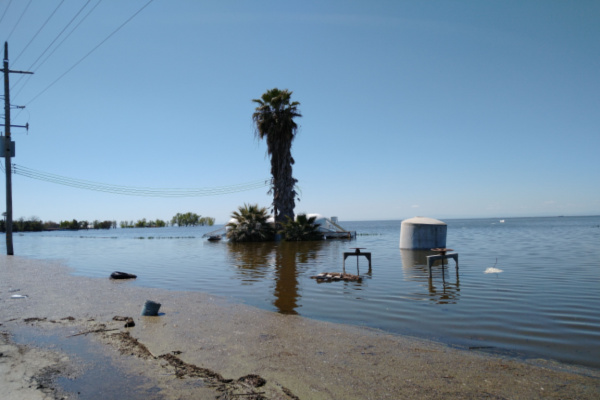The ‘big melt’ of the massive snowpack piled up across the Sierra range over the winter months has begun as a heat wave grips the region with temperatures forecast to reach near record highs later in the week.
As CBS News reports, there is 700 to 800 inches of snow accumulated across the range during a winter filled with atmospheric rivers, and now forecasters and water officials are casting wary eyes at rapidly rising water levels in rivers and creeks.
The National Weather Service has issued flood warnings and watches covering hundreds of miles of the High Sierra. “The big melt is now here,” said weather expert Dr. Daniel Swain. “Right now it is looking like this week is going to an exclamation point on this melting process.”
“Increasing temperatures with near record, or record breaking afternoon highs and warm morning lows will expedite snowmelt across the Sierra through the upcoming weekend,” according to the weather service’s Reno office. “Low elevation snow has recently taken a big hit so with temperatures expected to reach up to 20 degrees above average, we anticipate melting to begin rapidly eating away at the higher elevation snowpack as well.”
Among the areas covered by the alerts are Lake Tahoe and Yosemite National Park, where the Merced River has already flowed over its banks at the Pohono Bridge. It is expected to peak Monday at about 2 or 3 feet above its flood stage
Much of the park will close from Friday night until at least Wednesday morning due to flood risk. “Its a difficult decision and we understand that people are disappointed. But the health and safety of visitors is our primary concern,” said park spokesman Scott Gediman. “We’ve had our biggest snowpack on record. We’ve needed it here in California. We’re thankful for that. But it inevitably leads to snow melt.”
Now that epic snowpack is melting and filling waterways, neighbors in the Island District of Kings County have reactivated a crisis network to help each other prepare. The nearby city of Corcoran is adding to the top of a levee to try to keep water out. Across the region nerves are on edge as residents prepare to evacuate if necessary.
Water managers are concerned that the spring snowmelt in the Sierra Nevada will be so massive, the north fork of the Kings River won’t be able to contain it and carry it toward the Pacific Ocean. Much of the water is being channeled into the river’s south fork, which winds through the area to fill a vast basin.
More than a century ago, that basin was an enormous body of freshwater, the largest west of the Mississippi River, known as Tulare Lake, that would grow in winter as snowmelt streamed down from the mountains. But over time, settlers dammed and diverted waterways to irrigate crops, and the lake went dry. Now, Tulare Lake reappears only during the rainiest years, like this one, covering what is now a vast swath of farmland with water.
Today, paved roads vanish beneath the lake’s lapping waves and utility poles and trees jut out above the water, vestiges of land-living put on hold. Fields that typically grow wheat, tomatoes, and other crops lie underneath.
The winter rains were welcomed by California’s parched cities and desperate growers, who have been grappling with intense drought for the past several years. The state has long tended toward wet and dry periods, but scientists at University of California, San Diego’s Scripps Institution of Oceanography have said they expect climate change will lead to drier dry years and wetter wet years.
What will determine how communities fare now is how quickly the weather heats up. If temperatures remain cool, snow will melt slowly, with water gradually flowing from the mountains. But a hot spell could send massive amounts of water churning through rivers that could potentially overflow, officials said. A beaver or a squirrel that tears a hole in a levee could also bring trouble.
Forecasters also warned residents to stay away from the churning waters. They are extremely cold and if you fall in you, you won’t survive for long.
—
Photo Credit: Jason Taylor AG / Shutterstock.com
